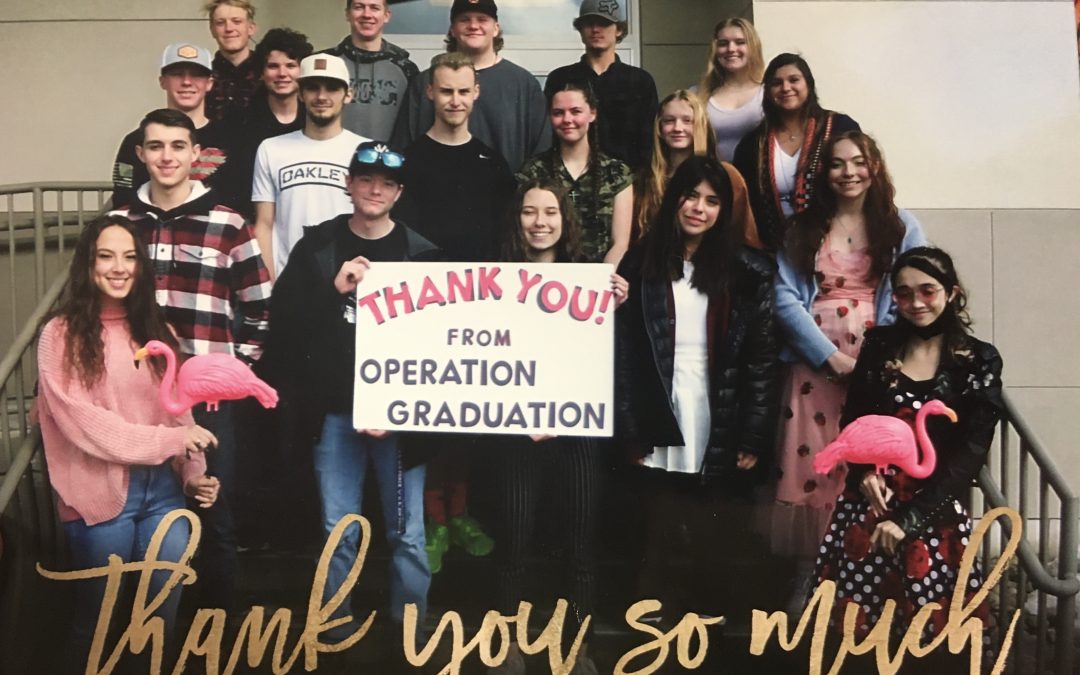The Dolores High School Class of 2021 seniors offer thanks for support of Operation Graduation on May 25. Axis Health System was proud to be a community sponsor of the event, which provided a fun, safe and substance-free celebration with prizes for high-school graduates.
Many high school graduates will head off to college this fall. As families prepare for the big send-off, an important checklist item is healthcare away from home. Where can freshmen go for same-day sick care, dental cleanings and check-ups? The gap between high school graduation and college freshman orientation is a good time to research healthcare options.
Parents and students often assume healthcare will be provided at student health centers located on campus; but some colleges do not accept parents’ private insurance. An off-campus medical home located in the community provides more payment options, more comprehensive care and access during school breaks. A medical home is a philosophy of quality healthcare that is patient-centered and team-based. Axis Health System’s medical homes in Southwest Colorado are convenient one-stop shops for primary care, mental health and dental care.
After a student gets established as a new patient, Axis clinics in Durango, Cortez and Pagosa Springs will customize care to each student with a wide variety of services, including:
- Crisis care through the Axis 24/7 Care Line: 970.247.5245
- Same-day sick care and routine check-ups
- Convenient telehealth visits
- Women’s Wellness Visits
- Immunizations
- Dental screenings, cleanings, fillings and restorative care
- Mental health services, medication management and substance use treatment
- Medicaid enrollment assistance (many students don’t know they qualify)
- Sexual Health & Family Planning, which includes birth control options and STD screening
Families are encouraged to use the summer before college to help freshmen get established as patients in a medical home close to their college campus. In Durango, call Durango Integrated Healthcare at 970.335.2288. In Cortez, call Cortez Integrated Healthcare at 970.565.7946.

Fort Lewis College students hold stress ball squishy bears with the Axis 24/7 Care Line number
(970.247.5245) during freshmen orientation in 2019.
In addition to finding and enrolling in a medical home, it’s important to have a checklist for the college freshman’s health and safety needs. Here are some tips from the American Academy of Pediatrics.
- Recognize that this is a time of excitement and adventure, but also a time filled with uncertainty. Planning ahead and getting support along the way can be helpful in making the transition easier for the student as well as for his or her family.
- A trip to a family physician’s office should be on the checklist for college-bound adolescents. A primary care provider can be a wonderful source of advice on helping your teen to transition successfully. In addition to making sure that the entering freshman has all of the vaccines and other preventive healthcare recommended for this stage of life, primary care providers also can help families prepare the way for their young adult’s continuing mental and emotional health.
- Pediatricians and family physicians can talk with college-bound teens about the risky situations they may encounter once they are away from home — and how to avoid, prepare for and manage these situations.
- Make sure that your teen has health insurance and knows how to access and use it. Your teen’s college most likely requires him to have health insurance, and many colleges offer plans for students who are not already covered. Many young adults can also be covered under their parents’ health insurance until they turn 26. Be sure to review the specifics of all health insurance plans available to your teen, since some may only provide limited coverage or benefits.
- Work with your pediatrician’s office to be sure that the college or university health center has all of the necessary information about your teen:
- Health insurance information
- Up-to-date immunization records
- Information about chronic health conditions
- Medication information including dosage
- Contact information for the primary care provider
- If your teen requires prescription refills, ask the college health center how best to arrange for this. If your teen has specific mental health needs, start working on developing a care plan with the college well before move-in day. Does your child have a mental health diagnosis, such as ADHD, depression, or an eating disorder? Be sure to ask the college health center staff what kind of medical information they will need related to your teen, and how to set up prescription refills if needed.
- Alcohol, drugs and sexual activity may become more accessible once teens are away from home. Be clear about your expectations regarding drug and alcohol use even though your child may not be living at home. Be sure your teen knows where to go – whether on campus or locally – for reproductive healthcare. Continue to have conversations about peer pressure, good decisions and consequences.
- Once your teen is settled into the college routine, keep in close contact and try to get frequent readings about how he is doing academically and socially. This is especially important during the first month or so while teens are still trying to settle in and may not have made many friends yet.
- It’s normal for young people starting at college to have days when they feel sad, homesick or a bit lost. If these feelings persist or interfere with their ability to work, they should seek help and know that it is normal to do so. Watch for warning signs and be prepared to act. Students need to know that there are counselors on campus and off campus waiting to help and support them.

Axis Health System staff meet students at the Fort Lewis College orientation in August 2019, from left: Gary Meisner, Melanee Hodge and Dr. Luke Casias.



